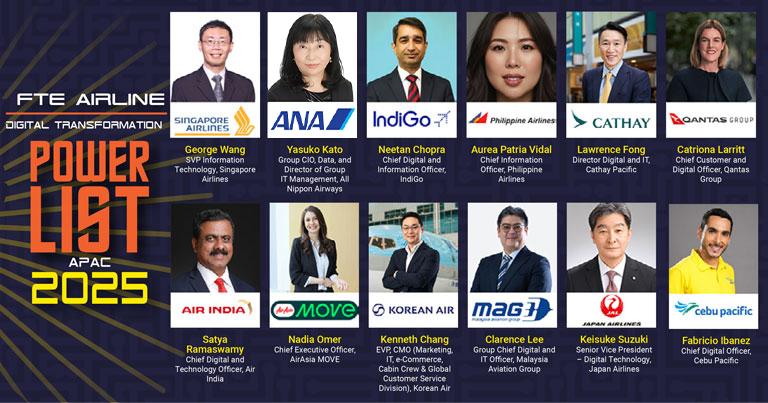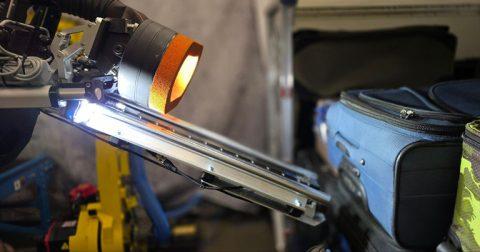Future Travel Experience is excited to unveil the FTE Airline Digital Transformation Power List Asia-Pacific 2025. Here we shine a light on those who are pioneering new approaches that have the potential to improve travel for passengers and make the industry safer, more efficient and commercially successful. The Asia-Pacific edition champions the most transformative change enablers within the airline and airport industry in the APAC region for their outstanding efforts to lead how their organisation has embraced digital innovation, reimagined customer experiences and delivered new approaches to operations. In 2025, FTE is more committed than ever to supporting digital transformation efforts in the industry through the FTE Digital, Innovation & Startup Hub, which is a truly unique community designed specifically for the individuals and organisations who are at the forefront of digital transformation and innovation in aviation. The FTE Hub is focusing on three key themes this year – Artificial Intelligence (AI), Robotics, and Internet of Things (IoT) – and in alignment with that, the Power List recognises those that are leading key digital transformation efforts. In recognition of their leadership and achievements, each member of the Power List will receive a complimentary “Golden Ticket” to APEX FTE Asia Expo, taking place in Singapore on 11 to 12 November 2025. After extensive research into each candidate, we believe the following 12 executives have been at the forefront of innovation, driving transformational change for their organisations and the wider industry.
George Wang, Senior Vice President Information Technology, Singapore Airlines

Singapore Airlines is committed to digital innovation and leadership in the airline industry. It is, for example, embracing generative AI (GenAI) and has developed a blueprint for its implementation across the organisation, exemplifying the airline’s commitment to leverage emerging technologies. As part of these efforts, Singapore Airlines and OpenAI recently announced they are working together to develop and implement advanced GenAI solutions for the airline, in a first-of-its-kind collaboration between OpenAI and a major carrier. These tools will be able to interpret text, audio, diagrams, and videos to augment customer servicing capabilities, as well as streamline processes to improve operational efficiencies and staff productivity. The two organisations are firstly partnering to improve Singapore Airlines’ existing AI-powered virtual assistant to deliver a more seamless and intuitive experience for customers as they plan, book, and manage their journeys.
Singapore Airlines takes a collaborative approach to technological advancements and customer-centric innovation. As part of this, it has signed a Memorandum of Understanding to collaborate on the International Aviation Lab established by the Civil Aviation Authority of Singapore to jointly explore, initiate and undertake innovation projects.
Singapore has an updated national artificial intelligence (AI) strategy – National AI Strategy 2.0 – with the aim of becoming a world leader in AI. National carrier Singapore Airlines is at the forefront of this AI revolution, and George Wang, Senior Vice President Information Technology, leads the team driving the incorporation of AI to optimise operations. The airline works closely with open innovation communities, startups and entrepreneurs through its Digital Innovation Lab, KrisLab. An example is Singapore Airlines’ partnership with a startup to develop a crew language competency app that leverages AI and speech recognition technology. This offers crew a platform to enhance their delivery of onboard announcements through asynchronous learning, enabling them to enhance their language skills and improve their enunciation.
Singapore Airlines is a Headline Partner of APEX FTE Asia Expo, taking place in Singapore on 11 to 12 November 2025.
View the APEX FTE Asia Expo Premium Conference agenda >> View the Expo Floor Schedule >> Register for APEX FTE Asia Expo 2025 >>
Yasuko Kato, Group CIO, Data, and Director of Group IT Management, All Nippon Airways

All Nippon Airways (ANA) is continuing its digital transformation journey, with plans to streamline its passenger service systems for “a seamless travel experience”, and as Group CIO, Data, and Director of Group IT Management, Yasuko Kato leads the team driving these efforts.
ANA is seeking to innovate and reimagine how the travel experience can be improved by harnessing the potential of technological innovation. This includes taking a pioneering approach to automation. Earlier this year, it joined the groundbreaking FTE Smart Ramp program, which has the ultimate goal that aircraft turnaround can be achieved autonomously and more efficiently. Each member is undertaking an innovation challenge, with ANA focusing on implementing autonomous towing tractors for cargo transportation to efficiently move cargo from the warehouse to the apron, reducing the need for manual labour in operations.
From October 2024, the VR training simulator ‘∀TRAS (Atlas)’ has been introduced to ANA Grand Handling Department training nationwide. The introduction of ‘∀TRAS (Atlas)’ will improve business efficiency and provide a nationwide training environment. It will lead to one of the solutions to the shortage of human resources in the entire ground handling industry.
Meanwhile, ANA Smart Travel aims to provide customers with a smooth and stress-free travel experience. The service model enables passengers to use their smartphones throughout their journey, with the intention of improving convenience and promoting contactless travel. Through these efforts, ANA aims to improve customer experience value, while strengthening its competitiveness and pursuing business efficiencies at the same time.
ANA is also innovating the inflight experience, recently unveiling ‘THE Room FX’ in collaboration with Safran. This next-generation Business Class seat has a privacy door for each seat of the Boeing 787-9 aircraft – the world’s largest seat in its class on a mid-sized aircraft.
Hear more from All Nippon Airways (ANA) in the Premium Conference at APEX FTE Asia Expo, taking place in Singapore on 11 to 12 November 2025. Tomoyuki Kikuchi, Manager, Ground Handling Planning, Airport Support, Operations Support Center, ANA, is speaking in a session focused on ‘Making autonomous airport operations a reality – inspiration from the first movers’.
View the APEX FTE Asia Expo Premium Conference agenda >> View the Expo Floor Schedule >> Register for APEX FTE Asia Expo 2025 >>
Neetan Chopra, Chief Digital and Information Officer, IndiGo
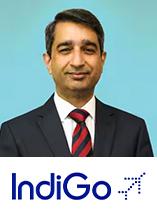
IndiGo is on a comprehensive digital transformation journey, with efforts driven via the team led by Neetan Chopra, Chief Digital and Information Officer. The airline is leveraging advanced cloud technologies, including artificial intelligence (AI), machine learning, and data analytics to deliver pioneering solutions and adapt to new industry trends.
In line with IndiGo’s digitisation roadmap and long-term sustainability goals, the airline recently introduced the SkyBreathe® Pilot App, marking a significant step towards enhancing safety, operational efficiency, and environmental stewardship. The mobile app – a key strategic initiative – is being introduced across the airline’s Airbus fleet, enabling enhanced situational awareness for pilots. The Pilot App leverages real-time data analytics and intelligent automation to monitor every phase of flight and ensure more efficient flight preparation by providing actionable insights to pilots.
IndiGo has also concluded its ambitious and intensive cloud migration initiative. This strategic transition enhances scalability, performance and customer service agility.
Embracing the power of collaborative innovation, IndiGo has entered a strategic partnership with GMR Hyderabad International Airport, with the aim of transforming the passenger experience. The initiative forms the beginning of a digital consortium whose objective is to reshape the landscape of the Indian aviation industry. The consortium is focused on deploying cutting-edge technologies to enhance operational efficiency, passenger experiences, and overall industry sustainability, including AI and the Internet of Things (IoT) as well as Blockchain and Data Mesh. While IndiGo and GMR are the founding partners of this industry consortium, the initiative aims to collaborate with multiple stakeholders in the aviation ecosystem to advance the key objectives of driving technological innovation, enhancing passenger services, achieving operational excellence, and embracing sustainable practices to minimise environmental impact.
Meanwhile, IndiGo’s AI efforts include the launch of a conversational AI booking assistant, 6Eskai, on WhatsApp. This addition to the airline’s digital ecosystem is built on the generative AI assistant platform developed by Riafy, a Google partner. It allows customers to book tickets, check-in, generate boarding passes, check their flight status, and ask their queries on WhatsApp.
Aurea Patria Vidal, Chief Information Officer, Philippine Airlines

Philippine Airlines (PAL) is committed to transforming its digital customer experience and the team led by Aurea Patria Vidal, Chief Information Officer, Philippine Airlines, is spearheading these efforts. As a key part of its digital transformation, PAL has integrated Salesforce Customer 360 – an integrated CRM platform powered by artificial intelligence (AI), across the airline’s contact centre and customer feedback handling units. This provides a comprehensive view of customer interactions to elevate the overall passenger experience while enhancing internal processes to improve efficiency. The results are impressive, reducing customer wait times from an hour to just a few minutes, boosting customer satisfaction scores from 60% to about 95%.
PAL has also re-engineered its refund process with Slack. As the first airline in Asia-Pacific to pilot Slack AI, PAL is automating repetitive tasks, improving response times, and creating smarter workflows. The result is that the airline is empowering its service agents to focus on high-priority issues to further elevate service quality.
PAL is also taking a bold step into the future of air travel distribution by launching a new, dynamic booking and selling platform through its integration with the New Distribution Capability (NDC) powered by Amadeus. NDC transforms the way PAL engages with travel partners and customers by enabling direct access to passenger preferences – from flight schedules and seat selections to inflight meals and other ancillary services. This initiative brings greater personalisation, transparency, and efficiency to the travel experience.
Meanwhile, PAL has partnered with SITA to manage and upgrade its network infrastructure and end-user computing solutions over the next five years.
Hear more from Philippine Airlines in the Premium Conference at APEX FTE Asia Expo, taking place in Singapore on 11 to 12 November 2025. Richard Nuttall, CEO, Philippine Airlines, is participating in the Opening Keynote Panel – ‘Leadership strategies to maximise capacity, operational efficiency, customer experiences, revenues and workforce, and be ready for change in the Asia-Pacific region and beyond’.
View the APEX FTE Asia Expo Premium Conference agenda >> View the Expo Floor Schedule >> Register for APEX FTE Asia Expo 2025 >>
Lawrence Fong, Director Digital and IT, Cathay Pacific

Cathay Pacific is continuously pursuing the development of new technologies that enable the airline to give customers more choice and control over their journeys, whether on the ground, in the air, or on digital channels. An important step in these efforts was the launch of Cathay Technologies in April 2025 – a new subsidiary created with the goal of bringing Cathay’s innovative digital solutions to the wider aviation industry. Cathay’s vision is to transform into a digital leader famous for its strong digital culture and capabilities, while keeping its people and customers at the heart of how the airline uses technology. In a significant first move, Cathay Technologies has forged a strategic partnership with the Hong Kong Science and Technology Park (HKSTP) on its Co-Acceleration Programme Fund, aiming to grow and nurture high-potential startups.
Cathay is embracing advanced conversational artificial intelligence (AI) to enhance customers’ digital experience. Under the airline’s conversational AI roadmap, Cathay is optimising its digital customer experience with the most cutting-edge language AI technologies.
The airline has also launched an intuitive booking platform, contactless boarding, and high-speed WiFi. Indeed, customers travelling in First or Business Class onboard connected Cathay Pacific aircraft now enjoy a complimentary WiFi service on their flight – just one of many enhancements the airline is making to the inflight customer experience.
It was announced earlier this year that Cathay Pacific and SITA – a Corporate Partner of the FTE Digital, Innovation & Startup Hub – are partnering to deliver network connectivity across 51 airports, optimising access to cloud technology. This collaboration provides Cathay Pacific with enhanced network connectivity across 51 global airports through the SITA Connect Go at Airports product, combining dual internet connectivity to provide bandwidth ranging up to 300 Mbps. This enables the airline to further enhance operational efficiency and continue focusing all efforts on its customers.
Meanwhile, Cathay Pacific recently opened a new Digital and IT Campus in Shenzhen, marking a major milestone in its digital transformation journey. This campus is more than just a new office – it is designed to foster collaboration, intelligence, and innovation. It features advanced facilities, including Cathay’s very first ‘Innovation Space’ dedicated to supporting technological research and development. This strategic move aims to accelerate the airline’s digital transformation and enhance its technological capabilities.
While many members of the Cathay team are contributing to its digital innovation efforts, Lawrence Fong, Director Digital and IT, is recognised on the Power List for his tech-focused leadership role.
Catriona Larritt, Chief Customer and Digital Officer, Qantas Group

Qantas Group is exploring the power of technologies such as artificial intelligence (AI), big data, cloud, the Internet of Things (IoT) and more to enhance operational efficiency and improve the customer experience.
As Chief Customer and Digital Officer, Catriona Larritt is responsible for the end-to-end customer experience, both digitally and physically. The airline’s digital transformation efforts focus on technology and data, with the digitisation of operations designed to enhance efficiency and decision-making processes. Tools such as AI and machine learning are enabling sophisticated optimisation of the workforce and asset deployment, while rapid learning from actual performance is refining planning models and driving further continuous improvement. The airline’s Jetstar subsidiary has also backed AI technology as an enabler for its own transformation.
Indeed, Qantas Group is embracing a number of use cases for AI, such as a better ticketing process, better-informed agents, and the chance to compress the time between the identification of customer problems and their resolution. Qantas Group is also considering the impact of the Large Language Models that underpin generative AI.
Meanwhile, the overhauled Qantas app gives customers more control over their bookings, as well as including the introduction of baggage tracking and better integration of Qantas Loyalty.
Satya Ramaswamy, Chief Digital and Technology Officer, Air India
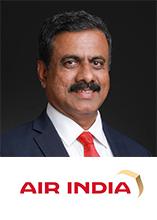
Air India’s transformation to a modern private airline has been characterised as the “Mount Everest of corporate turnarounds”. A key element of this is delivering experiences that make travellers feel supported through every stage of their journey on digital channels.
The airline’s five-year transformation journey – Vihaan.AI – has entered the ‘Climb’ phase, which focuses on achieving excellence in operations and customer experience. The myriad digital enhancements include a revamped website and app to enhance CX, a generative AI chatbot, India’s first biometric-enabled self bag drop facility at Bengaluru Airport, an enhanced employee experience through the launch of a single, unified enterprise portal known as myAI, and much more.
The airline has also introduced AEYE Vision – an innovative feature in the Air India mobile app, which is designed to elevate the customer experience using artificial intelligence (AI), Augmented Reality, and advanced camera technology. This feature leverages the mobile device’s camera to streamline various travel-related tasks, transforming passenger interactions with the Air India app. Air India is the first airline to integrate these technologies in a single platform.
Additionally, Air India is harnessing AI for operational excellence with Copilot for Microsoft 365.
As Air India continues to innovate and introduce cutting-edge digital capabilities as part of its customer-centric approach, the airline recently integrated Apple AirTag with its baggage-tracking system and mobile app, allowing customers using Apple devices to securely track the location of their baggage.
Air India also recently enhanced the inflight experience with the roll-out of WiFi internet connectivity services onboard domestic and international flights operated with the Airbus A350, Boeing 787-9 and select Airbus A321neo aircraft. This makes Air India the first to offer inflight WiFi internet connectivity on flights within India, enabling travellers to stay connected.
Satya Ramaswamy, Chief Digital and Technology Officer, leads the team responsible for Air India’s digital transformation efforts. He also plays a leadership role within the industry as a member of IATA’s Digital Transformation Advisory Council.
Hear more from Air India in the Premium Conference at APEX FTE Asia Expo, taking place in Singapore on 11 to 12 November 2025. Mir Amer Hussain, Head – Onboard Experience (Inflight Product & IFEC),, Air India, is participating in a session focused on ‘‘Inflight Innovation – how will the latest IFEC, cabin design and service developments redefine the onboard experience?’
View the APEX FTE Asia Expo Premium Conference agenda >> View the Expo Floor Schedule >> Register for APEX FTE Asia Expo 2025 >>
Nadia Omer, Chief Executive Officer, AirAsia MOVE

AirAsia has fast-tracked its digital transformation with the mission of pivoting from being primarily an airline into an all-in-one digital company with close to 20 travel and lifestyle products and services creating the “AirAsia way of life”. Central to these efforts is MOVE Digital – the digital arm of Capital A, which encompasses two transformative businesses – AirAsia MOVE and BigPay.
AirAsia is on a transformative journey “to elevate every traveller’s experience”. As the first step on this journey, AirAsia MOVE – formerly known as airasia Superapp and led by CEO Nadia Omer – has unveiled an updated, refreshed look for its app. From the app layout, to exciting new products, services and deals, the new AirAsia MOVE is designed to help customers “go all the way” seamlessly when they travel. AirAsia MOVE envisions travel complemented by a community-led experience through features such as AirAsia Chat, games, gifting, and a strong loyalty programme that rewards users across its expansive ecosystem.
AirAsia MOVE has swiftly become a one-stop travel platform offering value and convenience through seamless end-to-end booking experiences. It works closely with BigPay, which has established itself as an innovative fintech provider, to offer seamless access to travel and financial services on one single platform with integrated financial features.
Recently, to mark the 58th anniversary of ASEAN, AirAsia MOVE unveiled ‘Discover Asean’ – an integrated microsite created to make cross-border travel within the region more affordable and seamless. Launched in collaboration with the ASEAN Tourism Association (ASEANTA), the initiative is part of a broader effort to enhance regional tourism integration and connectivity through a digital-first approach.
Hear more from AirAsia at APEX FTE Asia Expo, taking place in Singapore on 11 to 12 November 2025. Nadia Omer, Chief Executive Officer, AirAsia MOVE, will deliver the Expo Stage Opening Keynote – ‘Built Different: How AirAsia MOVE is personalising travel, driving new revenue streams, and challenging the OTA status quo’.
View the APEX FTE Asia Expo Premium Conference agenda >> View the Expo Floor Schedule >> Register for APEX FTE Asia Expo 2025 >>
Kenneth Chang, Executive Vice President, CMO (Marketing, IT, e-Commerce, Cabin Crew & Global Customer Service Division), Korean Air
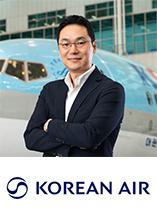
As national carrier of one of the world’s most digitally connected countries, Korean Air is spearheading its digital transformation journey. The team led by Kenneth Chang, Executive Vice President, CMO (Marketing, IT, e-Commerce, Cabin Crew & Global Customer Service Division), Korean Air, is the driving force behind these efforts.
The airline is incorporating innovative artificial intelligence (AI) technologies to improve the customer experience, notably through a partnership with Amazon Web Services (AWS) to develop an AI Contact Center (AICC) platform that incorporates innovative AI tech. The AICC is a cloud-based intelligent customer service platform that uses AI to power voice-bots and chatbots to answer customer enquiries. By utilising an AICC, it can offer more personalised and efficient customer support through innovative AI and cloud technologies, surpassing basic call centre services. The airline is further refining its services with the integration of machine learning and generative AI.
To build a culture of cloud innovation, Korean Air introduced the AWS Innovation Builder Program during its cloud migration to give employees the right skillsets to become data- and customer-centric and create a cloud-first culture. As part of this company-wide effort, Korean Air equipped 500 employees with basic cloud technology skills and brought the business and technology teams together to validate new ideas with speed and agility using AWS.
Meanwhile, Korean Air has entered into a partnership with U.S. technology company Anduril Industries to jointly develop and produce autonomous aircraft for Korea and the wider Asia-Pacific region. As a leading Korean UAV developer, Korean Air is expected to accelerate the advancement of its systems through this partnership, leveraging Anduril’s cutting-edge AI technology.
Clarence Lee, Group Chief Digital and IT Officer, Malaysia Aviation Group
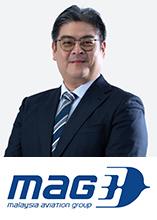
Malaysia Aviation Group (MAG) – comprising Malaysia Airlines, Firefly, MASwings, and AMAL by Malaysia Airlines – is reinforcing its commitment to digital empowerment and embracing cutting-edge technologies.
As Group Chief Digital and IT Officer, Clarence Lee champions MAG’s core belief that “Digital is Our Universe”. He leads the charge, spearheading digital and IT initiatives in supporting the Group’s Long Term Business Plan 2.0 (LTBP 2.0), which aims to transform MAG from a pureplay aviation business to Asia’s leading travel and aviation services group.
In a strategic move towards advancing its digital transformation journey, MAG has expanded its work on the Microsoft platform in Malaysia to enhance the Group’s suite of offerings, enrich user experiences, and fortify its technology platforms. As part of this extended collaboration, MAG is innovating in the areas of autonomous vehicles, data analytics, artificial intelligence (AI), machine learning, Augmented Reality, robotics and more.
Malaysia Airlines unveiled an innovative collaboration with Google, which is designed to further drive digital evolution. By harnessing cutting-edge digital marketing and AI marketing solutions to enhance its commercial operations, streamline processes and provide tailored experiences to travellers, this collaboration aims to foster ongoing growth and innovation, cultivating a holistic ecosystem that prioritises a seamless customer experience.
Keisuke Suzuki, Senior Vice President – Digital Technology, Japan Airlines
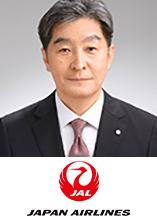
The team led by Keisuke Suzuki, Senior Vice President – Digital Technology, is the driving force behind Japan Airlines’ (JAL) digital transformation efforts. JAL is committed to leveraging digital technology to enhance safe and secure travel, create new customer experiences, and continually address social challenges while fostering digital transformation.
Artificial intelligence (AI) and machine learning technologies are central to the airline’s efforts to personalise the customer experience and enhance business performance. As part of these efforts, JAL has conducted a Proof of Concept for a generative AI solution aimed at enhancing the efficiency of cabin crew operations. By leveraging generative AI, JAL aims to streamline the handover report creation process and reduce the burden on cabin crew, allowing them to provide more personalised service to each customer. Meanwhile, the airline has been conducting joint research with Mitsubishi Heavy Industries, Ltd. to develop an AI prediction model that can accurately predict positions with high lightning probability, aiming to protect aircraft from lightning and improve safety and operational efficiency.
JAL is also leveraging automation and autonomous vehicles to enhance both operational efficiency and passenger experience, while testing NFTs as a way of deepening its customer relationships.
As part of the strategy to provide passengers with a connected inflight experience closer to that on the ground, Japan Airlines has expanded its free inflight WiFi service to all cabins on all international flights. First and Business Class passengers receive unlimited free WiFi to browse the web, stay connected on social media, and send/receive photos and texts throughout their flight. Meanwhile, Premium Economy and Economy Class passengers can take advantage of one hour of free WiFi to use when they wish.
Earlier this year, Japan Airlines and Panasonic Avionics Corporation revealed features of the inflight entertainment (IFE) system, digital solutions, and connectivity service installed on the carrier’s new Airbus A350-1000 fleet. The IFE system provides 4K screen technology, faster network speeds, higher storage capacity than previous generation systems, and the ability for travellers to design their own personalised journey. It also seamlessly integrates with the airline’s mobile app, allowing passengers to create a ‘favourites’ list pre-flight.
JAL is also entering the Urban Air Mobility space and aims to realise commercial operations by 2027.
Fabricio Ibanez, Chief Digital Officer, Cebu Pacific

As Chief Digital Officer of Cebu Pacific, Fabricio Ibanez – who took up the role in November 2024 – is laser-focused on best practice digital development to deliver highly effective and robust solutions to business and technology challenges.
Cebu Pacific is undergoing a comprehensive digital transformation to enhance customer experience, streamline operations, and improve efficiency, leveraging technologies like generative AI, cloud-first strategies, and data analytics.
As part of these efforts the airline recently announced a partnership with Ada to launch its first generative AI agent. This innovation positions Cebu Pacific as the first airline in Southeast Asia to fully integrate generative AI across its customer support channels. The aim is to elevate customer experiences across multiple touchpoints, ensuring instant, accurate, and human-like support at scale. It is just one example of Cebu Pacific’s commitment to providing quick and seamless solutions to its customers while optimising operations.
Cebu Pacific’s investment in digital transformation also includes improving its online platforms and integrating e-wallet payments to enhance the customer experience.
Meanwhile, Cebu Pacific recently signed an agreement with Lufthansa Systems to implement its next-generation operations control and crew management solution – a key step in supporting the airline’s ambitious growth plans. The operations control system collects and evaluates a wide range of data, such as weather conditions, airspace constraints and aircraft performance, alerting the operations control team to situations with potential operational, crew, or customer impact, enabling proactive measures to mitigate and resolve disruptions. The benefits include reduced operational costs and enhanced customer satisfaction through faster, data-driven decision-making.
Hear more from Cebu Pacific at APEX FTE Asia Expo, taking place in Singapore on 11 to 12 November 2025. Ana Katrina Bautista, Director of Customer Journey Management, Cebu Pacific, is participating in a session focused on ‘Innovative approaches to minimising the impact of disruption on passengers and the business’.
View the APEX FTE Asia Expo Premium Conference agenda >> View the Expo Floor Schedule >> Register for APEX FTE Asia Expo 2025 >> View the APEX FTE Asia Expo Premium Conference agenda >> View the Expo Floor Schedule >> Register for APEX FTE Asia Expo 2025 >>